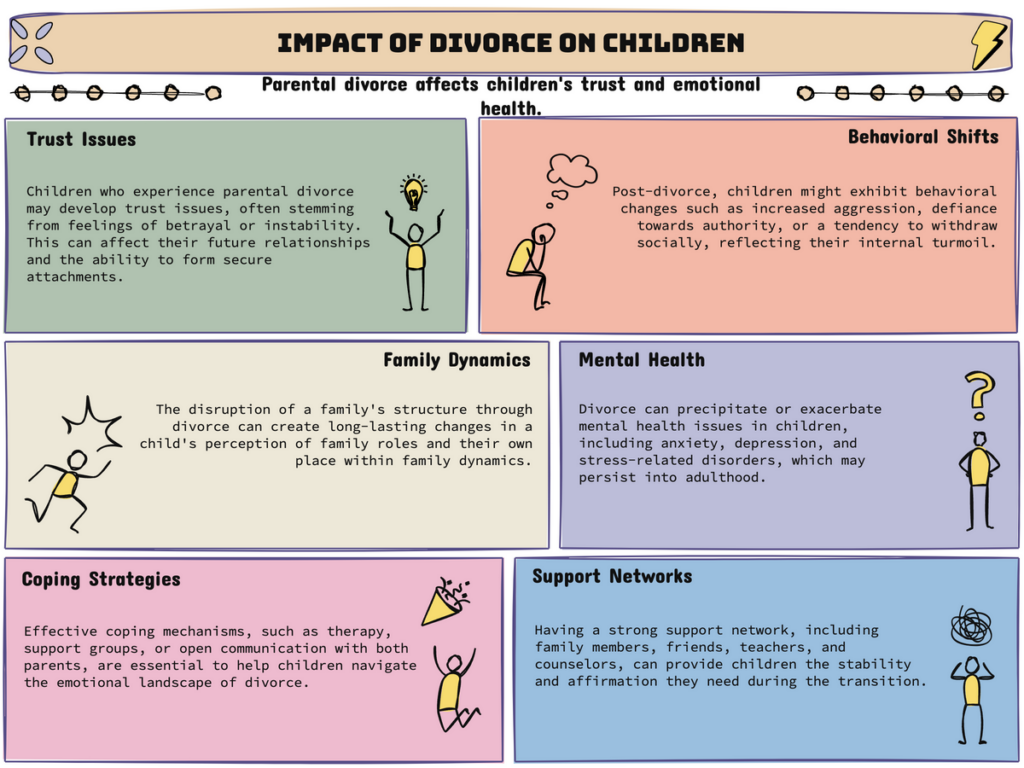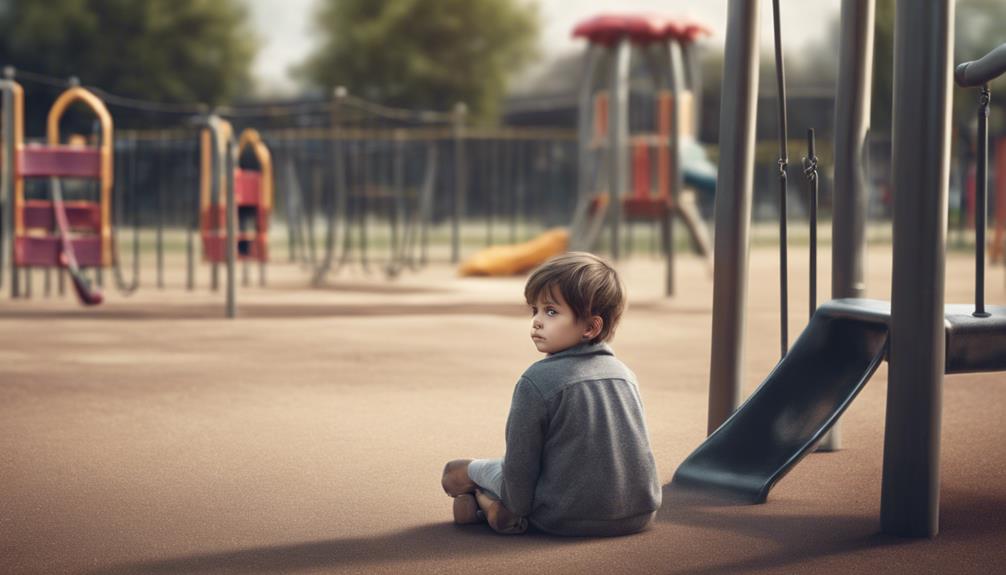We delve into the deep impact that divorce has on children, examining how this significant event influences their growth and welfare. The consequences, ranging from emotional distress to academic challenges, have a lasting effect.

But what about the former partners left in the aftermath? How do they navigate the complexities of post-divorce life? Join us as we unravel the distinct effects of divorce on children and former partners, shedding light on the divergent paths these individuals traverse in the wake of separation.
Key Takeaways
- Children’s trust and emotional well-being are significantly impacted by parental divorce.
- Behavioral changes in children can manifest as aggression, defiance, or withdrawal.
- Family structure disruption can lead to long-term effects on children’s mental health and stability.
- Coping mechanisms and ongoing support are crucial for children navigating the challenges of divorce.
Impact on Children’s Trust
Parental divorce significantly diminishes children’s trust in relationships, profoundly affecting their ability to cultivate secure connections. Trust issues often stem from witnessing the breakdown of their parent’s marriage, leading to negative attitudes toward relationships and marriage expectations.
Children of divorced parents may internalize a sense of relationship instability, which influences their commitment views in future relationships. Research indicates that individuals from divorced families are more likely to expect divorce in their relationships, perpetuating a cycle of uncertainty.
Moreover, the impact of parental divorce extends beyond just the immediate family; children of divorce have a higher likelihood of marrying other children of divorce, further reinforcing their experiences and shaping their perceptions of relationships. These experiences can hinder the development of secure connections in adulthood, highlighting the lasting effects of parental divorce on children’s trust and attitudes toward relationships.
Emotional Challenges for Children

Navigating the aftermath of divorce, children often grapple with a myriad of emotional challenges that profoundly impact their well-being and development. These challenges can have lasting effects on their mental health and relationships. Here are three key emotional challenges children of divorce may face:
- Anxiety and Depression: Children may experience heightened levels of anxiety and depression following their parents’ divorce. The sense of instability and changes in family dynamics can contribute to these mental health issues, affecting their overall emotional well-being.
- Behavioral Issues: Research suggests that children of divorce may exhibit behavioral problems as a result of the emotional turmoil they experience. These issues can manifest in various ways, such as acting out, withdrawal, or aggression, as they struggle to cope with the changes in their family life.
- Trust and Relationships: The emotional impact of divorce can make it challenging for children to trust others and form secure relationships. They may struggle with feelings of abandonment and rejection, which can affect their ability to build healthy connections with peers and family members.
Behavioral Changes in Children
Grasping how divorce impacts children emotionally, we now turn our focus to the behavioral changes that often manifest in children post-divorce. Children of divorce may exhibit various behavioral changes, such as increased aggression, defiance, withdrawal, acting out, difficulty following rules, and seeking attention.
These changes can be alarming but are often rooted in feelings of insecurity, loss, or confusion resulting from the impact of family structure disruption. Some children may even display regression in behavior, like bed-wetting or tantrums, as responses to parental divorce. It’s crucial to understand that behavioral changes in children post-divorce can vary depending on age, coping mechanisms, and the emotional support available to them.
By acknowledging these challenges, we can better support children in navigating the effects of divorce on their behavior and overall well-being.
| Impact of Family Structure | Developing Mental Health Issues | Coping Mechanisms | Academic Performance |
|---|---|---|---|
| Disruption can lead to behavioral changes | Children may be at risk for mental health conditions | Healthy coping strategies are essential | Academic performance may be affected |
Long-Term Effects on Children

Considering the long-term impact of divorce on children, it’s essential to understand the enduring effects that may shape their future well-being and relationships. Children of divorced parents often face a range of challenges that can persist over time, impacting various aspects of their lives.
Here are three key long-term effects on children:
- Changes in Family Dynamics: Parents’ separation can lead to significant shifts in family structure and support systems, affecting a child’s sense of stability and security.
- Emotional Support Systems: Divorce can disrupt the emotional support networks available to children, potentially leading to feelings of isolation or difficulty in seeking help during times of need.
- Behavioral Challenges and Academic Performance: The long-term effects of divorce may manifest in behavioral issues like aggression or withdrawal, which can, in turn, impact academic performance and social interactions. This highlights the importance of ongoing support and understanding for the child’s well-being.
Strategies for Supporting Children
To best support children through the challenges of divorce, prioritizing stability and open communication is crucial. A consistent routine and stable environment can help children feel secure amidst the changes. Encouraging open communication and allowing children to express their emotions can aid in processing their feelings effectively.
It’s essential to reassure children that the divorce is not their fault to prevent any feelings of guilt or self-blame. Developing a clear co-parenting plan with the other parent and refraining from conflicts in front of the children can promote security and normalcy. Seeking professional help or counseling for children struggling emotionally can offer additional support and guidance during this challenging time.
| Strategies for Supporting Children | |||
|---|---|---|---|
| Prioritize stability and routines | Encourage open communication and emotional expression | Reassure children they are not at fault for the divorce | Create a consistent co-parenting plan |
Frequently Asked Questions
What Age Is Divorce Most Damaging to a Child?
Divorce can be most damaging to children during their formative years, typically between 6-8. They may internalize blame, leading to insecurity and emotional distress. It’s crucial to offer age-appropriate support and understanding during this challenging time.
What Are the Two Most Harmful Effects of Divorce on Children?
Divorce can deeply impact children’s mental health, leading to issues like anxiety and depression. Academic performance may suffer, with lower grades and focus. These effects can persist, influencing behavior and future relationships, highlighting the long-term consequences of divorce.
What Personality Disorders Are Associated With High Conflict Divorce?
We understand the difficulties of high conflict divorce situations. Borderline, narcissistic, antisocial, histrionic, and paranoid personality disorders often amplify tensions. Seeking support and understanding these dynamics can help navigate these challenging times with compassion and clarity.
Why Are Children Most Affected by Divorce?
Divorce most affects children due to disruptions in routine, emotional stability, and security. Research shows they may face academic, social, and emotional challenges. Parental divorce can cause guilt, confusion, and blame, impacting well-being.
Can the Outcomes Described for Children of Divorce in Your Guide Change Over Time?
Yes, the outcomes of divorce for children described in your guide can change over time. Children’s emotions and reactions may evolve as they grow older and better understand the circumstances. It’s important to continue monitoring and addressing their needs as they navigate the changes brought on by divorce.
Conclusion
As we navigate the complexities of divorce, let’s remember the impact it has on our children.
Take the case of Sarah, whose academic performance suffered after her parents’ divorce. By providing her with stability, open communication, and emotional support, Sarah overcame these challenges and thrived in school.
Let’s prioritize our children’s well-being post-divorce and create a supportive environment for them to flourish.










